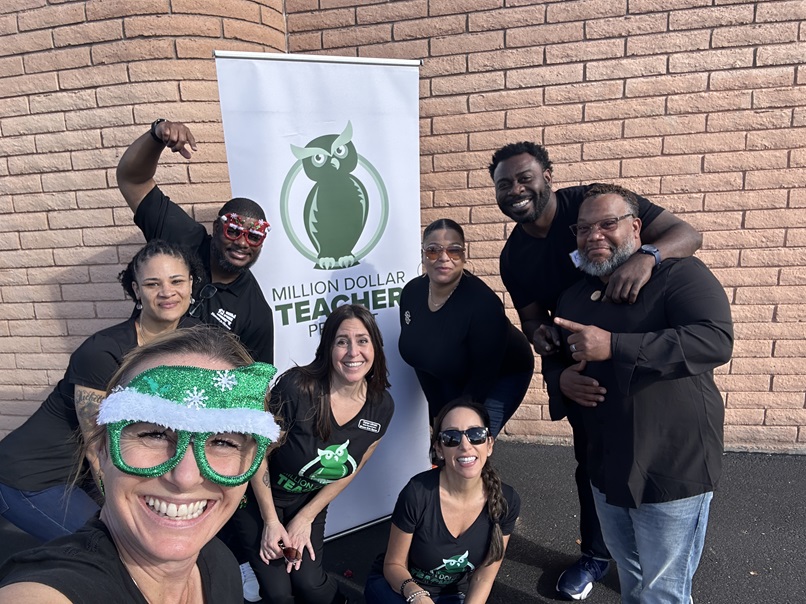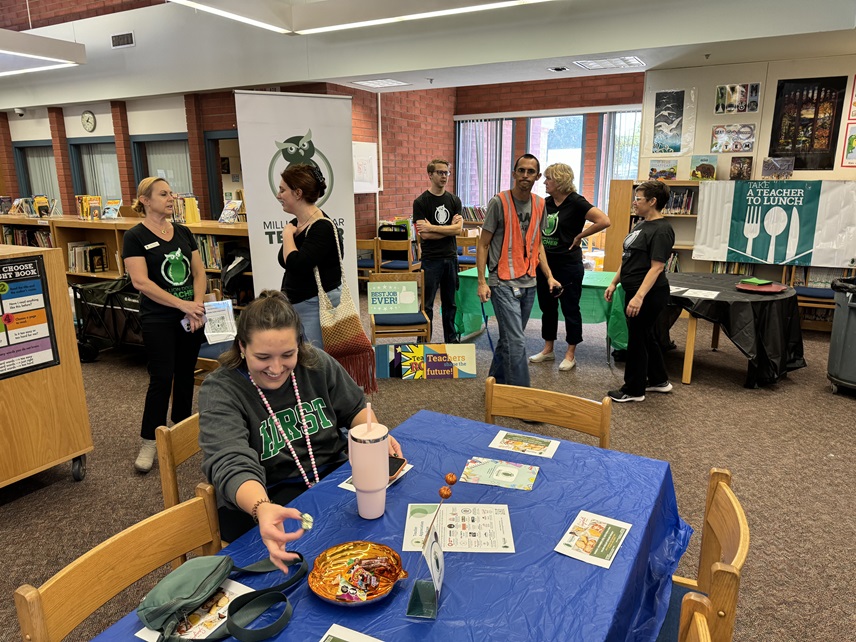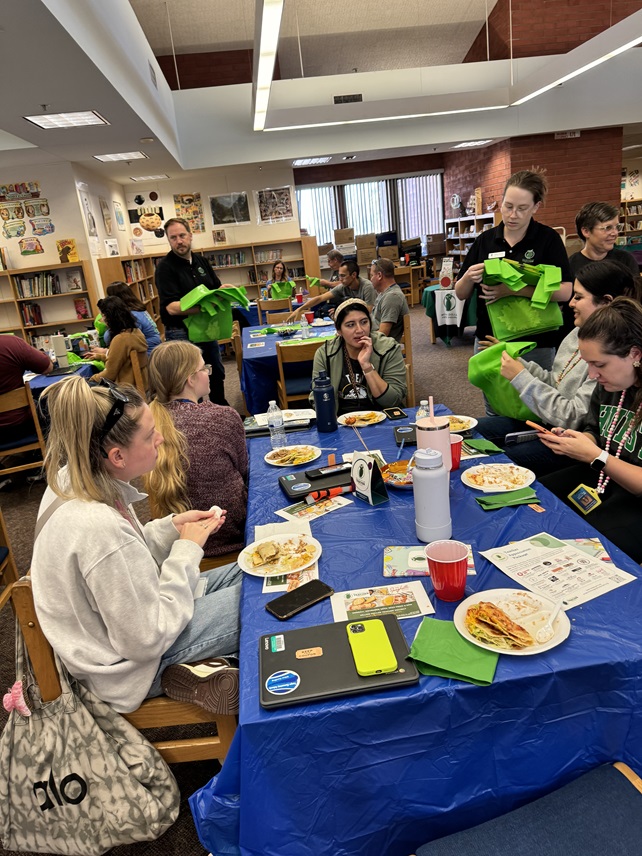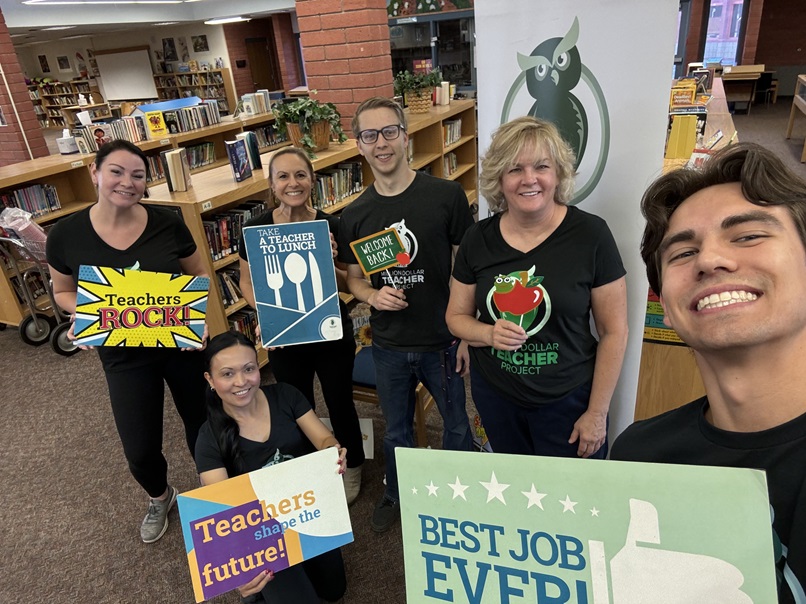
Million Dollar Teacher Project Helps Exceptional Teachers Impact More Students
The Million Dollar Teacher Project (MDTP) gets at the root cause of the failures in our education system: making sure that teachers have what they need to do their job. Part of what those teachers need is recognition. If the teaching profession is truly noble, we must treat teachers as the noble beings they are.
But teachers need more than that. They need support inside the classroom to help deliver lessons, and they need to be compensated fairly—to have the wherewithal to support themselves and their families, and to further their own education. Unfortunately, too many nonprofits focus on the children alone, and fail to look at our teachers. MDTP is different because the focus is on strengthening teachers and the teaching profession as the wellspring of our children’s education.
Our small grant program exists for the purpose of encouraging and lending support to nonprofits doing original work on behalf of America’s children. The Million Dollar Teacher Project, certainly qualifies with its novel approach to improving our children’s education. We put some questions to MDTP Executive Director Lloyd Hopkins, to learn more about this work:
Kars4Kids: The Million Dollar Teacher Project was founded in 2016 with the aim of improving Arizona schools by directing resources and support to the teaching profession. Can you tell us a bit about the Arizona schools you serve and why they are in need of improvement?
Lloyd Hopkins: MDTP serves Title I Schools in marginalized communities across the valley. A key factor of a school being designated as Title I is the number of students on the campus qualifying for free and reduced lunch. This means that the majority of the students on the campus are living at or below the poverty level which is a part of being eligible to receive free or reduced lunch at school. These campuses are also hit the hardest by teacher turnover for several reasons.
Our goal is to address that issue head on, because the work of ensuring all kids receive a quality education starts with great teachers in the classroom. We want to see the schools we partner with become the destination for top teaching talent.

Kars4Kids: Rather than direct resources and support to teachers, Million Dollar Teacher Project directs resources and support to the “teaching profession”. Presumably this is a broader category that includes teachers, but other things, as well. Can you explain the distinction?
Lloyd Hopkins: We do a combination of both. We bring programming that directly impacts teachers and have initiatives targeted towards elevating the profession. This approach is important because we have to have strategies that help address the immediate needs of teachers, so they stay in the classroom. We also need strategies that elevate the profession so it becomes aspirational to become a teacher, so more kids are interested in the profession, strengthening the future teacher pipeline.
Kars4Kids: Million Dollar Teacher Project started its Focus School Program in 2021. What is a “focus school” and why did the MDTP decide to launch this program?
Lloyd Hopkins: Focus Schools are campuses where we create immersive, multi-year partnerships, and where the school is saturated with the full menu of our program for 3 to 5 years. The first three years our organization is leading the program delivery, and years 4 and 5 are targeted towards helping the school deliver our programs on their own. We then move on to another campus to start the program again.
We launched this approach so we can build deeper relationships with our partner schools and the communities they serve; track data that illustrates how our program model impacts student outcomes; and create a network of schools that operate under the MDTP model.

Kars4Kids: Your program has a three-pillar approach. What are the three pillars and how and why did you choose them?
Lloyd Hopkins: Our 3 pillars are Recognition, Compensation and Support. We chose these pillars after surveying teachers across the state and allowing them to inform us of the challenges that are most adversely affecting teacher retention and recruitment. The responses came back, resoundingly so, with lack of recognition and professional respect, low compensation and lack of support as the top challenges. So, when I decided to create our program model I wanted to create something to address those key areas of support, recognition and compensation.
Kars4Kids: What are some of the ways you are recognizing teachers?
Lloyd Hopkins: We recognize teachers through our Take a Teacher to Lunch initiative where we partner with restaurants and businesses to bring full catered lunch celebrations to campuses to celebrate their teachers over lunch. We highlight teachers monthly through our One in a Million series where we select a different, exceptional teacher each month through a nomination process and they receive a gift package from us and our partners, in addition to recognition through our website, social media and radio. We also have a podcast named the Teacher’s Lounge where we have in depth conversations with teachers about the profession.
Kars4Kids: In regard to your compensation pillar, MDTP has an endowment program and a Teacher Appreciation Package. Can you give us an overview of these programs and some examples of how these two programs lent assistance to teachers?
Lloyd Hopkins: We established the In Teachers We Trust Fund in 2022 to create a mechanism to offer financial assistance in a variety of ways to teachers who are experiencing financial hardships, looking to continue their education, or demonstrating excellence in the profession. The fund will also be used to offer grants to schools to operate our programming and other nonprofits looking to serve teachers. We established the fund and are now engaged in a campaign to grow the fund to 9 million dollars to grow our grant giving.
Through the Teacher Appreciation Package (T.A.P. for short), we work with businesses to offer meaningful discounts on goods and services to teachers, twice a year—in November for ‘Thank a Teacher’ month—and in May during Teacher Appreciation week), in an effort to help their current salaries go further by enabling them to retain more of their hard-earned money during those key points in the year.
Kars4Kids: The third pillar, support, includes classroom support teams. Can you describe these teams and their work?
Lloyd Hopkins: We work with universities, community colleges, and volunteer organizations to recruit interns and volunteers to work on a school campus as a team to support a grade level of teachers from September – March. Each CST intern commits to 10 hours a week and assists teachers with lesson planning; classroom management; working directly with students; and assisting in as many ways as possible. On average, we give teachers about 3,000 percent of their time back through this program.
Kars4Kids: Is there a personal story behind the founding of MDTP?
Lloyd Hopkins: I was a “slipped through the cracks” kid growing up and never had a teacher that took me under their wing or made me feel special. I created MDTP to ensure that every student has that, and to ensure that the exceptional teachers who do provide these things to their students, are able to impact even more students.

Kars4Kids: In 2018, MDTP started a blog, highlighting and interviewing individual teachers. How do you choose which teachers to highlight? What are the most common support issues cited by these educators?
Lloyd Hopkins: Teachers are nominated through our One in a Million series and those are the ones interviewed and highlighted on our website. Classroom volunteers and supplies are often the most popular support requests we receive.
Kars4Kids: What’s next for the Million Dollar Teacher Project?
Lloyd Hopkins: We are working on growing our endowment so we can expand our efforts around giving out grants to teachers and the education community. We are working with the city of Tempe to establish a Teacher Resource Center, which will be a first-of-its-kind facility in this state, once up and running. Also, we are beginning to conduct research on the economic impact of quality teachers, in hopes of being able to impact policy in the future.